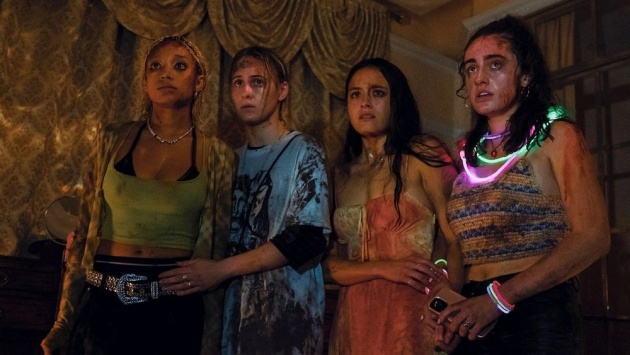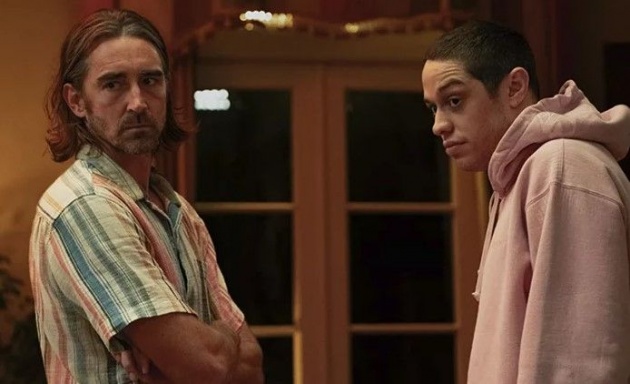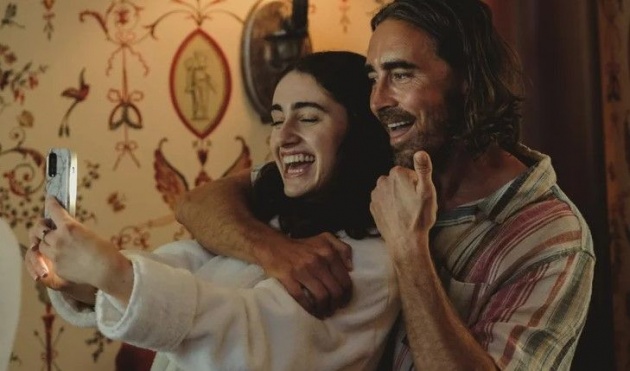
Pictured: Glowsticks and mobile phones at the ready. Sophie (Amandla Stenberg), Bee (Maria Bakalova), Emma (Chase Sui Wonders) and Alice (Rachel Sennott) in a scene from the horror flick, 'Bodies Bodies Bodies' written by Sarah DeLappe and directed by Halina Reijn. Still courtesy of A24 Films (US) / Sony Pictures Entertainment (UK)
Spoiler Free
The test of a horror mystery is to reflect on the events within it and trace the outcomes back to the perpetrator. Bodies Bodies Bodies passes with distinction. Directed by Halina Reijn (Instinct) from a smart screenplay credited to Sarah Delappe and a story by Kristen Roupenian, the film features a quintet of mostly wealthy twenty-something women, and their male companions, who turn on each other after a hurricane party game of ‘bodies bodies bodies’ goes very awry. When one member of the group ends up dead with a sword wound to the neck, their blood-smeared dressing-gowned body pressed against a window, the group seeks the killer, concluding that their activity has gone too far. One of their number is in bed, having retired early and earlier squared off against the victim. ‘The best defence is a good offence,’ says one guest. ‘What does that even mean?’ asks the victim. The guest simply repeats the phrase, as if no further explanation is required. Any game that begins with slapping – ‘come on, as hard as you can’ – is bound to get people riled up. Values and loyalties are tested.
The central conceit is that every character has a ‘condition’, which means they are more or less unstable. One person with a ‘condition’ in a group may be fine. Seven is a little much. The film has been criticised by one reviewer as a feeble satire of the upper classes. However, they missed the point. The film is about the competition between conditions – drug addiction, narcissism, borderline personality disorder, ‘gender dysmorphia’ (a mash-up of body dysmorphia and gender dysphoria) – as to which has special status. If everyone is crying for help, who’s listening?
To write a semi-synopsis would spoil some of the pleasure. Part of the experience of a horror mystery is wondering who will die next. In describing the film, I’ll avoid being specific about the ‘who’ once the bodies start piling up.
The film begins with a lingering close up of Bee (Maria Bakalova) and Sophie (Amandla Stenberg) kissing. Boom: an interracial lesbian expression of desire. That’s the Christian Right alienated straight away. Dutch director Reijn luxuriates in the kiss. She wants us to remember it. The longer you hold a scene, the more you create doubt. These two women are kissing in the open air but is their expression really for each other? Is one enjoying the kiss more than the other. In films, we are used to long kisses signifying foreplay before a crossfade to the bedroom, or the beginnings of a kiss followed by a fade out prompting us to imagine the rest. This kiss is more of a political gesture. Although we see one of the women reach down, the kiss is immediately terminated. It is not a prelude to showing the actresses’ bodies. Boom: that’s the Christian Right alienated, again.
Bee and Sophie have been together six weeks. The former works at Game Pod and studied at Utah State. The latter is, as we discover, a former drug addict. They are on their way to meet Sophie’s friend, David (Pete Davidson, formerly of Saturday Night Live and the only marquee name) who is hosting a gathering at his father’s mansion. The party was arranged through a group chat, the film’s first indicator that technology is integral to successful social interaction; who leaves post-it notes on fridges anymore? Sophie did not confirm her attendance, let alone state that she was bringing an outsider. Activity spreadsheets need to be adjusted.
At a certain point, Sophie stalls the car. The engine is running but the car isn’t moving. Have they reached a hill that the car can’t climb? Bee watches Sophie as she gets out, the camera staying in the car. Reijn lingers on Bee long enough for us to feel anxious – absences are crucial to suspense. Then we see Bee pressing a button to open the gate to the mansion. They continue on their way.
Just before Bee joins the group, she tells Sophie that she has forgotten something and asks to go back to the car. Sophie gives her the keys. She fetches a Zucchini cake wrapped in cling film – her present for the host. Neither of them drink. She also pulls down a mirror and applies make up. The car is notable for not having automatic locking. It is not modern. The detail is small but tells us that it has been purchased with limited resources. We later find out that Sophie has been cut off by her parents.
The host and his guests are gathered by the pool. David is anxious about people touching his dad’s stuff, notably when a bottle of champagne is opened and poured sloppily (lots to unpack there). He and Sophie were close. ‘Have you spoken to my parents?’ she asks him early on. David receives the gift of Zucchini cake as if it were a foreign object. David’s social group deals in branded goods, though for clearance reasons, no names are used; this is a modest budgeted movie. It is interesting that social satires have moved from naming products as signifiers of status to naming mental health conditions, as if the millennial generation seeks to be ‘post-capitalist’. If you focus on your own headspace, you give yourself an excuse not to engage in politics; you need to fix yourself first. This could also be a product of Trump’s presidency. The American public accepted Trump’s gaslighting – a word derided by David later on (‘what does it even mean?’) – so that the former President proposed an alternate reality not supported by facts. Is it any wonder that, rather than address an error of judgment, a weakness used against them, people claimed infirmity, a condition that explains the surrender of reason?

Pictured: 'Who is the Alpha Male? Me or you?' Greg (Lee Pace) and David (Pete Davidson) face off in the mystery horror flick, 'Bodies Bodies Bodies', directed by Halina Reijn. Still courtesy of A24 Films (US) / Sony Pictures Entertainment (UK)
Before I go on, it would be rude of me not to introduce the four other guests.
Alice (Rachel Sennott) is a podcaster, whose subject is the bringing together of people. ‘It’s so hard. You start with a google list,’ she explains.
Greg (Lee Pace) is Alice’s companion, at least fifteen years her senior. Pace plays him like the lost brother of Owen and Luke Wilson. He’s laid back and not too assertive. His ‘condition’ is that he is unmarried and dates younger women. Later, he’s considered a murder suspect because of his profession - ‘a vet’. Alice defends him. ‘He treats animals,’ she explains; he's not a veteran. ‘Why does he carry a knife?’ she is asked.
Emma (Chase Sui Wonders) is an aspiring actress (and David’s girlfriend) who isn’t believed when she gets emotional. Why? Because she is good at pretending. The Ibsen play ‘Hedda Gabler’ is name-checked twice. Its title character is a bored and troubling, newly married woman who gives one character the means to kill themselves and then uses that means on herself. Hedda is another woman with a condition, burning a manuscript belonging to a rival of her husband. She opts out of control by a man in an extreme way. Her ‘condition’ may excuse her actions but equally could have been created by her environment. It is no surprise that the filmmakers would use Ibsen’s play as a touchstone; it signifies ambiguity.
The final guest – but by no means the final girl – is Jordan (Myha’la Herrold) who may still be holding a candle for Sophie. When Sophie sees Jordan dancing closely with Bee, she suggests the ‘Bodies Bodies Bodies’ game.
The game itself is a variation on ‘Mafia’ or ‘Werewolf’, neither of which I have played. It involves somebody holding a piece of paper with the letter ‘x’ being designated the killer. The person stalks the other partygoers and ‘kills’ them on discovery (presumably identifying themselves with the ‘x’). The remaining guests who survive the killing have to work out who the killer is. The ‘dead’ guest doesn’t take part in the whodunnit part of the evening, which must be boring. That’s why I prefer ‘Scrabble’.
With one guest dead for real, five others seek out the member of the group who has opted out. There is a confrontation in a basketball court that ends with another fatality, claimed as self-defence. Before the night is out, there are more fatalities, including one caused by Hedda Gabler’s weapon of choice – well, a gun rather than a pistol.
The filmmakers could have equally borrowed Almodóvar’s title, Women on the Verge of a Nervous Breakdown. The killer of victim two certainly acted like offence is the best form of defence. The phrase has a double meaning. If I am offended, I can defend myself from blame. Alice is offended to discover that her so-called friends ‘hate-listened’ to her podcast in the way that audiences in the UK are currently hate-watching Michael Flatley’s filmic folly, Blackbird.
The one missing guest is Max (Connor O’Malley) who declared his love for Emma and who left the previous day, promising to return. Talk about the best decision a guy could make. He does indeed return to discover carnage and the guilty party.

Pictured: 'Smile for the camera. What does that even mean?' Alice (Rachel Sennott) and Greg (Lee Pace) give good selfie in the horror mystery, 'Bodies Bodies Bodies', written by Sarah DeLappe and directed by Halina Reijn. Still courtesy of A24 Films (US) / Sony Pictures Entertainment (UK)
Surprisingly for a hurricane party, there is no damage to the property from inclement weather, which is a lucky escape. If there is a moral to the story – not strictly necessary – it is to lock up your weapons, all of them, and of course to calm the f- down.
Do mental health conditions let the characters off the hook? I don’t believe they do. At the end of the day, even characters with impaired judgment are responsible for their choices. If the film makes a plea for anything, it is to resist the urge to feed paranoia.
I was certainly seduced by the momentum caused by the series of chaotic events and bad decisions impacting on one another. Sometimes ‘character’ should be inaction. You have to pick your moment though. There is a purple passage roughly twenty minutes before the end when an emotional hurricane is whipped up, characters exchanging buzzwords, describing themselves.
Bodies Bodies Bodies could equally be called ‘Mind Mind Mind’ – thought processes plus ‘the rules of the game’ drive characters to bizarre conclusions. Greg had the best attitude: lie down, relax, avoid confrontation. The others could learn a lot from their elder.
Reviewed at Cineworld Leicester Square, London, Screen Five, Tuesday 23 August 2022, 19:30 ‘Unlimited’ Preview Screening



